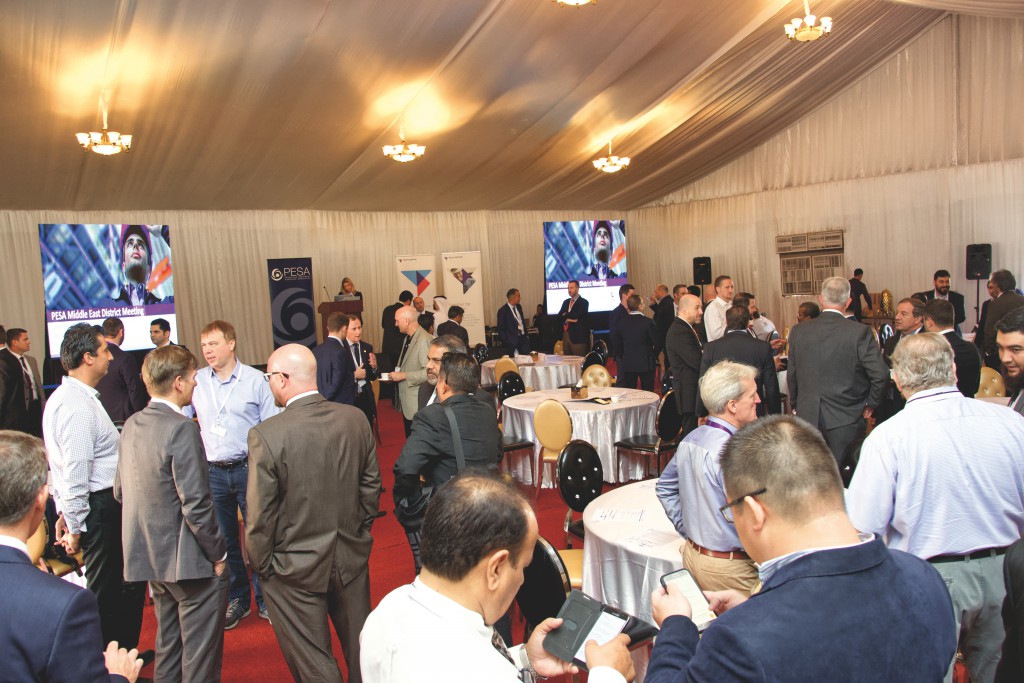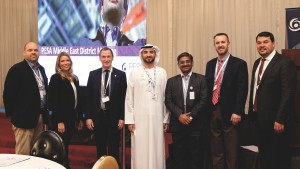
PESA’s Middle East Regional Chapter met at TechnipFMC in Abu Dhabi on November 15 during the Abu Dhabi International Petroleum Exhibition and Conference (ADIPEC).
Attendees heard from regional experts who discussed the challenges and risks of operating in the area, as well as engaged in best-practice sharing.

Steve Abbiss, TechnipFMC; Leslie Beyer, PESA; PESA Board Member Richard Alabaster, TechnipFMC; Hamad Belmehaina, In Country Value, ADNOC; Gopalakrishnan Gopakumar, In Country Value, ADNOC; PESA Advisory Board Member Scott Livingston, National Oilwell Varco; and PESA Middle East Committee Chair Dennis Jol, DistributionNOW
INDUSTRY PERSPECTIVE
Hamad Belmehaina, Senior Specialist, In-Country Value, ADNOC, provided an overview of ADNOC’s In-Country Value (ICV) program, a procurement-led initiative aimed at boosting ADNOC’s ICV contribution by focusing on local supplier selection, development of UAE Nationals and the localization of critical functionalities in the oil and gas industry.
ADNOC implemented the program a year ago and has since made significant strides and achievements, namely having more than 1,500 ICV-certified suppliers. Belmehaina outlined ADNOC’s long-term objectives for this program, citing the most important as hiring Emiratis employees in the private sector, GDP diversification and strategic consideration.
This dedicated program has also fostered engagement across ADNOC’s certified supplier base, with more than 100 awareness and engagement sessions, conferences and meetings focused on building positive relationships with their partners.
U.S. COMPANY PROGRESS
Thomas Bruns, Regional Senior Commercial Officer, UAE, Qatar, Kuwait and Oman from the U.S. Embassy in Abu Dhabi, addressed U.S. corporate development in the UAE.
Bruns discussed the total trade of the U.S. Gulf Cooperation Council (GCC), which is approximately $86 billion, making the UAE the largest U.S. trade partner in the Middle East. With 1,500 U.S. companies with regional headquarters and operations in the UAE, Bruns was not surprised to see more than 140 U.S. exhibitors at ADIPEC.
[su_quote cite=”Thomas Bruns, Regional Senior Commercial Officer, UAE, Qatar, Kuwait and Oman, U.S. Embassy in Abu Dhabi“] “The U.S./GCC partnership is strong and growing, and our support at ADIPEC for the U.S. pavilion doesn’t stop here.”[/su_quote]
The Commercial Service is recruiting a regional delegation for the 2019 Offshore Technology Conference (OTC) in Houston and are currently advocating for U.S. companies in the region as they bid for government tenders. This will help to level the playing field against Chinese and European competitors.
Although there had been progress as the Commercial Service advocates for a more transparent and business-friendly environment, Bruns also discussed regional issues he and his team are dedicated to addressing, such as trade barriers, market access issues, localization policies, the enforcement of intellectual property rights and payment avoidance. “Working with our GCC counterparts we are looking for ways to help U.S. companies navigate through these issues,” Bruns said.
CHALLENGES & RISK
In his keynote speech, Shahin Shamsabadi, Head of Business Intelligence & Investigations-MENA, Risk Advisory Group, addressed three key challenges and risks for the area: stability, consolidation and competition.
Shamsabadi noted that although stability has always been a hallmark of the Gulf, significant changes have occurred during the past 10-20 years. Gulf states are more integrated into the global economy, countries have grown significantly economically and relying on oil revenues is not a reality anymore.
[su_quote cite=”Shahin Shamsabadi, Head of Business Intelligence & Investigations-MENA, Risk Advisory Group“] “The intersection between stability and all the other factors at play is more important today than it was two decades ago because business follows certainty.”[/su_quote]
As changes continue to occur, consolidation is being driven by stability and is rapidly changing the landscape.
“In a region where opposition does not present itself in the form of a Republican versus Democratic rivalry, the government can consolidate enterprises and institutions with little or no obstacles,” he said.
Samsabadi also discussed competition in the region as national oil companies seek to become more competitive. They will need to influence government policy in order to avoid complacency and restrictions, he said.
“Allowing for 100% of foreign ownership would be a move in that direction,” he said. “This would allow for NOC’s to decide whether they wanted to work solely with local partners or go at it alone, as well as go after competitive bids.”
Samsabadi closed by explaining these three challenges coming together full circle.
[su_quote cite=”Shahin Shamsabadi, Head of Business Intelligence & Investigations-MENA, Risk Advisory Group“] “Competition will feed into stability and consolidation can, if politically supported, put national oil companies in a position where they lead the other industries, or they can at least lead them to a more beneficial and competitive business environment,” he said. [/su_quote]
PESA MENA CHAPTER
After the address, attendees convened for a group luncheon to informally discuss region-specific issues. PESA Board Vice Chair Richard Alabaster, President – Surface Technologies, TechnipFMC, and PESA President Leslie Beyer provided overviews of PESA’s mission and goals in international development.
PESA Middle East Regional Chairman Dennis Jol, VP – International, DistributionNOW discussed the PESA Middle East Regional Chapter, explaining the committee structure and the roles and responsibilities of the Committee members. There are currently four subcommittees: Supply Chain, Local Content, Local Employment and HSE, each with their own Chair, Co-Chair and team. Jol discussed the challenges the sector is currently facing with regard to each of these industry branches and is hopeful PESA Member Companies can work together to share knowledge and best practices.
Member Companies participating in the meeting included: Baker Hughes, a GE company, Caterpillar Oil & Gas, DistributionNOW, Energy Alloys, Exterran, Forum Energy Technologies, Galtway Industries, Galtway Marketing, Gardner Denver, Halliburton, M&M International, NOV, Oceaneering, SOR, TechnipFMC, Tenaris, Weatherford and Weir Oil & Gas.
The mission of the Regional District Meeting was to provide a collective environment where PESA members were able to address MENA region-specific issues through an influential industry group, engage in best-practice sharing within anti-trust compliance and receive region-specific industry intelligence.
If you are interested in joining the PESA MENA Regional District Chapter, the International Outposts Committee or any of the PESA MENA Subcommittees, please contact Molly Determan.




